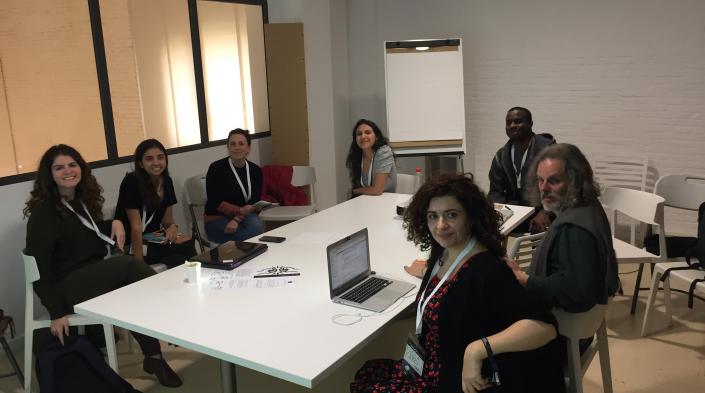
Published on
Page last updated on
The internet was developed with the promise of democratising access to knowledge and enabling the exercise of freedom of expression. However, the emergence of corporations with enormous market power has affected freedom of expression and diversity. To discuss the implications of these trends, the Electronic Frontier Froundation (EFF), the Association for Progressive Communications (APC) and APC member Intervozes opened up a discussion at the Internet Freedom Festival taking place in Valencia, Spain.
The session, which focused on the applications and content layer, started with Marcos Urupa of Intervozes introducing the conclusions of a recently launched research report on Diversity and concentration on the internet in Brazil.
With more than half the population of Brazil now connected to the internet, the online environment is increasingly challenged by the influence of large conglomerates, from traditional to new digital monopolies, Urupa stressed. While there are more voices and an appearance of diversity, concentration is increasing in the sphere of sharing and circulation, with platforms and intermediaries modulating and establishing limits, rules and standards of information control. If the concentration trend is a concern in the applications and content layer, it deserves even more attention in terms of the production and dissemination of discourse, with regard to cultural goods, world views, news stories and political opinions, for instance.
Urupa was followed by Veridiana Almonti of EFF, who touched upon the role that competition policies could play in offering real choices in the digital landscape, by fostering solutions such as data portability, a feature that allows users to take their data from a service and transfer it elsewhere.
“It enables us not only to bring our data to a competing service, but also to better analyse all the data a specific service has about us, build something new out of our data, and generally achieve greater transparency, explained Almonti. “Considerations on free expression and privacy safeguards should be at the very centre of any definition of quality for a digital service and product within competition policies and decisions,” she added.
Presenters stressed the need for more debate among players in the internet field – and within society as a whole – about which internet is desirable and how it can be built, ensuring that it can contribute to a more equal and democratic society, especially in a period marked by institutional crises and restriction of liberties.
Local solutions: Community-owned networks
Representing APC, Leila Nachawati brought attention to the need to promote local solutions that do not depend on states and big market players. The current trend poses a risk to a free, open and neutral internet both at the connectivity and the applications layers, which makes the need for autonomous, community-owned infrastructures increasingly relevant.
Community networks are a safer access solution, involving less chances of suffering internet disruptions. As the community has more ownership of the information flow, the risk of censorship and surveillance is reduced. Community-run networks also enable the participation of a diversity of members of a community, including women, and promote equity. All of this has an impact on the exercise of human rights and economic, social and cultural rights. These networks are based on collaboration rather than competition, which tends to create more favourable conditions to the exercise of rights.
The session included a case study of a local access network established in Mankosi, a community in South Africa, by APC member Zenzeleni Networks, which has been at the forefront of efforts to bridge the digital divide through community-based initiatives and make affordable Wi-Fi a reality in areas whose needs are not met by large service providers.
About the IFF
The Internet Freedom Festival (IFF) held in Valencia, Spain on a yearly basis has become one of the main events for civil society on internet rights, with a special focus on surveillance, censorship and circumvention worldwide. The 2019 IFF marks an important milestone, as it is celebrating its fifth anniversary, with occasions for celebration and reflection.
The Festival can be followed remotely through the #InternetFF hashtag and by following @InternetFF. At APC, we'll be sharing live updates on @apc_news and @takebackthetech.
Read also:
-
Monopólios digitais serão tema de atividade do Intervozes no Internet Freedom Festival, na Espanha
-
Digital Monopolies: Diversity and concentration on the internet in Brazil
-
Connecting the unconnected: Supporting community networks and other community-based initiatives
Photo: Marcos Urupa


